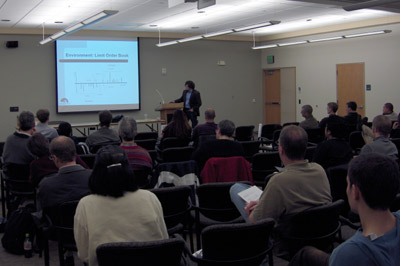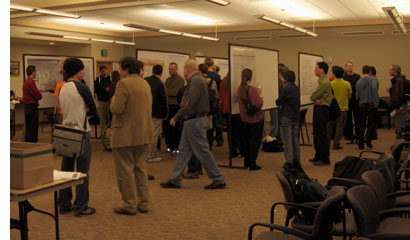« February 2005 | Main | April 2005 »
March 23, 2005
Flying west to get east
 In a few hours, I leave on my first trip to the Asian continent (I don't count my trip to Turkey in 2002). Depending on Internet access, time and motivation, I may make updates from abroad, but don't count on it. I'll definitely write something when I return, and post lots of pictures. Tenatively, I'll say that I'll resume my sporadic posting on April 5th.
In a few hours, I leave on my first trip to the Asian continent (I don't count my trip to Turkey in 2002). Depending on Internet access, time and motivation, I may make updates from abroad, but don't count on it. I'll definitely write something when I return, and post lots of pictures. Tenatively, I'll say that I'll resume my sporadic posting on April 5th.
My itinerary begins with flying into Tokyo, where I'll spend three or four days. In addition to seeing the sights and experiencing the megopolis, I'll be visiting friend Chris Salzberg and his research lab. It's always nice to mix a little business scouting in with all the pleasure. Who knows, maybe I'll apply for post-docs in Tokyo in a few years. After Tokyo, it's off to historic Kyoto where I'll fend for myself for several days, before finally heading to the southern island of Kyushu to visit friend Jenn Louie in the city of Miyazaki.
posted March 23, 2005 09:49 PM in Self Referential | permalink | Comments (0)
March 21, 2005
die Welt auf einer Zeichenkette
 One of the big three German language daily newspapers die Welt ran a story about our work on the power law in global terrorism (warning: in German; English translation) on its front page (above the fold) on Saturday, March 19. Google's translation of the article is less than pleasant, ah well. Should have paid more attention in my German language class in college.
One of the big three German language daily newspapers die Welt ran a story about our work on the power law in global terrorism (warning: in German; English translation) on its front page (above the fold) on Saturday, March 19. Google's translation of the article is less than pleasant, ah well. Should have paid more attention in my German language class in college.
(The image is © die Welt 2005)
posted March 21, 2005 11:47 AM in Self Referential | permalink | Comments (0)
March 20, 2005
Review: Hackers and Painters
I recently finished reading the book "Hackers and Painters" by Paul Graham. Graham is notable for having cashed out of the dot-com era when he sold his company ViaWeb to Yahoo!. ViaWeb built online store software that apparently now runs the nearly ubiquitous Yahoo! Store used by some hundreds of thousands of small businesses. Hackers and Painters is basically a collection of only loosely related essays that Graham has written over the past years, many of which appear in their entirety on his website. An interesting biographical fact about Graham are that he holds graduate degrees in both computer science and fine art. This dual perspective is the basis for the title of his book and for a couple of the essays in which he tries to draw similarities between the skills and dedication required to be a good hacker or a good painter. Ultimately, it's a symmetry that I am still not convinced about, despite lots of nice pictures of Renaissance art.
Generally, I would put Hackers and Painters in a similar category to Malcolm Gladwell's "The Tipping Point", or his more recent book "Blink" (which I am refusing to read on account of it's premise being complete bullshit). Basically, these books are written so as to paint an overly simplistic view of the way complex systems in the world work. Graham is not at his best when he's spouting capitalist propaganda about how to get rich but rather when he writes from his own formative experiences, such as his explanation of why nerds are unpopular, or how ViaWeb became more nimble than its competition. Just like Gladwell, Graham's writing style is seductively reductionistic, and brims with short, apparently explanatory anecdotes combined with shallow and conventional-wisdom-style broad generalizations, but actually conceal a host of unspoken assumptions about both the world and the reader. For that, I disliked Graham's conclusions quite a bit, although there are times when he does make interesting and potentially profound observations, such as about the importance of being aware of how language itself can subtly guide cultural evolution.
Here's a short list of silly generalizations one can glean from the text. There are many more reasonable and probably accurate generalizations, along with a wealth of information about how Graham built ViaWeb into a strong business. I omit those nuggets of wisdom because this is a bad review (if you're curious, peruse Graham's list of online essays).
- People who are not rich are that way because they have chosen not to work as hard as those who are.
- Economic inequality is a sign that some people are working a lot harder than everyone else (which is a good thing).
- Being successful in the software business has everything to do with choosing a superior programming language (e.g., LISP).
- Hackers should be allowed to run the world, because they're smarter, work harder and have great ideas.
- Academics should not design programming languages. Unless, that is, they design good ones (e.g., LISP).
- What makes a language popular is its power. except, of course, when it comes to LISP, which is not popular because of politics and pointy-haired middle managers.
- Java is a bad language, and is only popular because of politics and pointy-haired middle manages.
Generally, I wasn't impressed by the book, although there were some very enjoyable sections of it. Had it been published 4-5 years earlier, when the dot-com culture was still freshly interesting, it would be been more interesting since many of his essays focus around the lessons he learned from running a successful start-up company. However, when I finished the book, I was still left wondering about the subtitle - what exactly where the Big Ideas from the Computer Age? Perhaps something about the value of smart, independent people working hard in small groups, and the romantic notion that these groups of people can and will change the world. In this case, he's concerned about these group of people changing the world with computers, but honestly, hasn't it always been those groups of people who change the world, regardless of what tools they use?
"Hackers and Painters: Big Ideas from the Computer Age", by Paul Graham.
ISBN: 0596006624, $15.61 at Amazon.com
Hardcover: 271 pages (hardcover), published by O'Reilly (May, 2004)
posted March 20, 2005 05:07 PM in Reviews | permalink | Comments (0)
March 16, 2005
Some bad, some good.
A first for this blog, but probably not the last. Many things that I read or thought about today, some good, some bad:
Paul "Give me another war" Wolfowitz is Bush's absurd pick for the head of the World Bank. Especially sad considering that he could have had Bono. But maybe not that surprising considering his pick of John "The U.N. doesn't exist" Bolton for the ambassador to the UN position. Plus, two democratic senators (from Hawaii no less) failed to use all the neurons in their brains and allowed the Arctic National Wildlife Refuge to be flagged as an industrial development site. But at least the California constitution doesn't forbid gay marriage anymore (predictably, Bush backs bigots in response).
Religiosity is 40% genetic. And pastors have recently taken to evangelizing in the land of the godless: the British supermarket? Actually, perhaps this says something about why Americans are so religious. Think: genetic selection.
The X-chromosome is making lots of headlines. Seems it's a lot more complicated than anyone expected (and it was already pretty complicated). And then there's the amazingly slick idea to track the movement of nucleotides in DNA by creating a phony fifth base.
The real online pirates are a pretty interesting bunch. Although they still get caught by the Feds, and then interviewed by journalists. How long has identity theft been a problem in the US? How long have US companies been little better than a leaky bucket for our personal information? Congress may finally be realizing that this is a topic on which it's better to side with voters.
The finance pirates (or, as they are lovingly called in the movie Igby Goes Down, neo-fascists) also took several hits this week (oh, there's another hit). I'm not entirely convinced that corporate America is actually changing for the good, or if its dirty ways are just being pushed further underground. Let's just say there's a lot of hard work to be done before my faith is restored.
And finally, who says Ivy League professors are boring? Jon Stewart with Professor Harry Frankfurt from Princeton "On Bullshit".
There, and now you know most of the sites I visit on a daily basis.
p.s. Who says IRC isn't useful?
posted March 16, 2005 11:58 PM in Political Wonk | permalink | Comments (0)
March 13, 2005
The virtues of playing dice
In physics, everyone (well, almost) assumes that true randomness does exist, because so much of modern physics is built on this utilitarian assumption. Despite some people being very determined to do so, physicists have not determined that determinism isn't the rule of the universe; all they have is a bunch of empirical evidence against it (which for most physicists, is enough). So-called "hidden variable" models have been a popular way (e.g., here, here and here) to probe this question in a principled fashion. They're based on the premise that if in, for instance quantum mechanics, there was some hidden variable that we've just been too stupid to figure out yet, then there must be regularities (correlations) in physical reality that betray its existence. Yet so far, no hidden variable model has prevailed against quantum mechanics and apparent true randomness. (For an excellent discussion of randomness and physics, see Stephen Hawkings' lectures on the subject, especially if you wonder about things like black holes.)
 In computer science, everyone knows that there's no way to deterministically create a truly random number. Amusingly, computer scientists often assume that physicists have settled the existence of randomness; yet, why hasn't anyone yet stuck a black-body radiation device inside of each computer (which would be ever-so-useful)? Perhaps getting true randomness is trickier than they have come to believe. In the meantime, those of us who want randomness in computer programs have to make do with the aptly-named pseudo-random number generators (some of which are extremely sophisticated) that create strings of numbers that only appear to be random. (It can be very dangerous to forget that pseudo-random number generators are completely deterministic, as I've blogged about before.) It frequently surprises me that in computer science, most people appear to believe that randomness is Bad in computer programs, but maybe that's just the systems and languages people who want machines to be predictable. This is a silly idea, really, as with randomness, you can beat adversaries that (even extremely sophisticated) determinism cannot. Also, it's often a lot easier to be random than it is to be deterministic in a complicated fashion. These things seem rather important for topics like oh, computer security. Perhaps the coolest use for pseudo-random number generators is in synchronization of wireless devices via frequency hopping.
In computer science, everyone knows that there's no way to deterministically create a truly random number. Amusingly, computer scientists often assume that physicists have settled the existence of randomness; yet, why hasn't anyone yet stuck a black-body radiation device inside of each computer (which would be ever-so-useful)? Perhaps getting true randomness is trickier than they have come to believe. In the meantime, those of us who want randomness in computer programs have to make do with the aptly-named pseudo-random number generators (some of which are extremely sophisticated) that create strings of numbers that only appear to be random. (It can be very dangerous to forget that pseudo-random number generators are completely deterministic, as I've blogged about before.) It frequently surprises me that in computer science, most people appear to believe that randomness is Bad in computer programs, but maybe that's just the systems and languages people who want machines to be predictable. This is a silly idea, really, as with randomness, you can beat adversaries that (even extremely sophisticated) determinism cannot. Also, it's often a lot easier to be random than it is to be deterministic in a complicated fashion. These things seem rather important for topics like oh, computer security. Perhaps the coolest use for pseudo-random number generators is in synchronization of wireless devices via frequency hopping.
There are a couple of interesting points derived from Shannon's information theory about randomness and determinism. For instance, my esteemed advisor showed that when a technologies uses electromagnetic radiation (like radio waves) to transmit information, it has the same power spectrum as black-body radiation. This little result apparently ended up in a science-fiction book by Ian Stewart in which the cosmic microwave background radiation was actually a message from someone-or-other - was it God or an ancient alien race? (Stewart has also written a book on randomness, chaos and mathematics, which I'll have to pick up sometime.)
Here's an interesting gedanken experiment with regard to competition and randomness. Consider the case where you are competing against some adversary (e.g., your next-door neighbor, or, if you like, gay-married terrorists) in a game of dramatic consequence. Let's assume that you both will pursue strategies that are not completely random (that is, you can occasionally rely upon astrology or dice to make a decision, but not all the time). If you both are using sufficiently sophisticated strategies (and perhaps have infinite computational power to analyze your opponent's past behavior and make predictions about future behavior), then your opponent's actions will appear as if to be drawn from a completely random strategy; as will your own. That is, if you can detect some correlation or pattern in your opponent's strategy, then naturally you can use that to your advantage. But if your opponent knows that you will do this, which is a logical assumption, then your opponent will eliminate that structure. (This point raises an interesting question for stock marketers - because we have limited computational power, are we bound to create exploitable structure in the way we buy and sell stocks?)
The symmetry between really complicated determinism and apparent randomness is a much more universally useful property than I think it's given credit for, particularly in the world of modeling of complex systems (like the stock market, navigation on a network, and avalanches). When faced with such a system that you want to model, the right strategy to pursue is probably something like: 1) select the most simple mechanisms that are required to produce the desired behavior and then 2) use randomness for everything else. You could say that your model then has "zero intelligence", but in light of our gedanken experiment, perhaps that's a misnomer. Ultimately, if the model works, you have successfully demonstrated that a lot of the fine structure of the world that may appear to matter to some people doesn't actually matter at all (at least for the property you modeled), and that the assumed mechanisms are, at most, the necessary set for your modeled property. The success of such random models is very impressive and begs the question that does it make any difference in the end if we believe that human society (or whatever system was modeled) is not largely random? This is exactly the kind of idea that Jared Diamond explores in his recent book on the failure of past great civilizations - maybe life really is just random, and we're too stubborn to admit it.
posted March 13, 2005 12:26 AM in Thinking Aloud | permalink | Comments (0)
March 08, 2005
Of Men and Machines
The human concept of self is incredibly flexible. Yet we are often quite attached to the notion that our self is somehow special, e.g., many of us dislike believing that our mind is actually just an emergent property of the mechanics of our neurocircuitry. Because our mind feels so separate from our body, mustn't it be so? If the body is just the thing that the mind inhabits, then augmenting the body with machinery should do nothing to our sense of self or our mind, right? But can the main withstand the brain itself being augmented? Sure, we've not yet blurred the distinction between man and machine to the extent that Masamune Shirow does in the incredibly elegant universe of Ghost in the Shell (2 manga series, 2 movies, and 1 tv series, so far), but only those who haven't been paying attention to history will deny that we are moving in that direction. Such a future holds promises of things like externalized memory, thought-controlled computers, and artificial eyes that see a much wider range of the electromagnetic spectrum are just a few of the things that may come to pass. Or, if you prefer more benevolent applications, fully functional replacement limbs for amputees, replacement wrists for those of us with carpal tunnel syndrome, etc. These are the stuffs of science-fiction today.
 But consider the recent progress in interfacing brains and machines, like a monkey learning to control a robotic arm with neural impulses. Again, if you prefer less extreme examples, consider the everyday task of driving a car, in which you exhibit your extremely flexible sense of spatial self-extent. How is it that you can "sense" how close your car is to the curb when you park? Or, navigate a parking lot with as much ease as you would navigate a crowded room? Consider any video game, in which players inevitably gain an amazing degree of control over their virtual avatar by mentally mapping hand-movements into visual feedback. Or, consider that whenever you pick up an object in your hand, like a pencil, your brain extends its sense of 'self' to encompass the extent of that object. For all practical purposes, that object becomes a part of you while it's in your hand, or at least, your brain treats it as such. Basically, the human brain easily adapts to whatever regularities it perceives in its streams of input, so there seems to be no reason, in principle, why it couldn't learn to use a mechanical body part in lieu of an organic one just as easily as you learn to wield that pencil or a tennis racket.
But consider the recent progress in interfacing brains and machines, like a monkey learning to control a robotic arm with neural impulses. Again, if you prefer less extreme examples, consider the everyday task of driving a car, in which you exhibit your extremely flexible sense of spatial self-extent. How is it that you can "sense" how close your car is to the curb when you park? Or, navigate a parking lot with as much ease as you would navigate a crowded room? Consider any video game, in which players inevitably gain an amazing degree of control over their virtual avatar by mentally mapping hand-movements into visual feedback. Or, consider that whenever you pick up an object in your hand, like a pencil, your brain extends its sense of 'self' to encompass the extent of that object. For all practical purposes, that object becomes a part of you while it's in your hand, or at least, your brain treats it as such. Basically, the human brain easily adapts to whatever regularities it perceives in its streams of input, so there seems to be no reason, in principle, why it couldn't learn to use a mechanical body part in lieu of an organic one just as easily as you learn to wield that pencil or a tennis racket.
Although cybernetic limbs may seem an outlandish possibility, for amputees, they are the freedom to participate more fully in society. One of the most interesting and amazing ventures in this domain is the biomechanics lab at the MIT Media Lab, which is itself run by a man with artificial legs. When I was touring the Media Lab back in January, this was the group that I thought was the most interesting and one of the few that seemed to being doing real science that has the potential to dramatically alter the world. But, what happens when one can make a prosthetic arm that not only does everything a real arm does, but does it better than the original, and perhaps does more? Won't people then choose to become an amputee in order to gain those advantages. For thousands of years, humans have preferred the advantages of tools over the basic abilities granted us by evolution (well, unless you're Amish), so isn't cybernetic enhancement the logical extension of this tendency? The usefulness of machines lies in their extending our own small set of abilities to a much larger set of possibilities. Cars let us go faster and longer than our legs allow; planes let us fly without needing wings; and computers let us (among other things) stay organized at the global level. Machines gives us the ability to surpass our humble roots and achieve the things that our imaginations dream up.
 This premise of choosing cybernetic body-enhancements over the natural body is the basis for much of the plot of Ghost in the Shell (and much of the cyberpunk literature). But ultimately, I don't think that it will be science that has the most trouble with putting flesh and steel in the proverbial blender, but rather humanity's deeply rooted fear of the unknown. If biomechanical enhancement ever becomes popular, i.e., beyond a medical need, I'm sure there will be hate-crimes perpetrated against those participants for betraying humanity, or becoming inhuman monsters. The religious right along with other fearful and conservative groups will condemn the practice as ungodly, and try to make non-medical augmentation illegal. But I doubt the public discourse on augmentation will really address the fundamental question of humanity that Ghost in the Shell explores (as does another of my favorite manga series, Battle Angel Alita). That is, how many body parts are you willing to replace with mechanical versions before you begin to feel less "human"? Will the choice of getting a mechanical part that is visually dissimilar to its organic version actually be a choice of reducing your apparent humanity? (Won't people treat you differently if you don't look human?) Which is more human, a completely human brain encased in a completely mechanical body, or a completely mechanical brain encased in a completely human body? If the mechanical brain is functionally equivalent to the human brain, can it be considered legitimately different? What if we put that completely mechanical brain in a completely mechanical body? What happens when an "artificial" human learns to behave like a real human? (As, for instance, in the exquisite vision of Blade Runner.)
This premise of choosing cybernetic body-enhancements over the natural body is the basis for much of the plot of Ghost in the Shell (and much of the cyberpunk literature). But ultimately, I don't think that it will be science that has the most trouble with putting flesh and steel in the proverbial blender, but rather humanity's deeply rooted fear of the unknown. If biomechanical enhancement ever becomes popular, i.e., beyond a medical need, I'm sure there will be hate-crimes perpetrated against those participants for betraying humanity, or becoming inhuman monsters. The religious right along with other fearful and conservative groups will condemn the practice as ungodly, and try to make non-medical augmentation illegal. But I doubt the public discourse on augmentation will really address the fundamental question of humanity that Ghost in the Shell explores (as does another of my favorite manga series, Battle Angel Alita). That is, how many body parts are you willing to replace with mechanical versions before you begin to feel less "human"? Will the choice of getting a mechanical part that is visually dissimilar to its organic version actually be a choice of reducing your apparent humanity? (Won't people treat you differently if you don't look human?) Which is more human, a completely human brain encased in a completely mechanical body, or a completely mechanical brain encased in a completely human body? If the mechanical brain is functionally equivalent to the human brain, can it be considered legitimately different? What if we put that completely mechanical brain in a completely mechanical body? What happens when an "artificial" human learns to behave like a real human? (As, for instance, in the exquisite vision of Blade Runner.)
In Ghost in the Shell, the protagonist Major Motoko Kusanagi, equipped with a state-of-the-art cyborg body that contains just her brain/spinal column, is in the midst of wrestling with these questions when a completely digital life form known as The Puppeteer asks her to merge with him to become a new form of life in the sea of information on the Internets. Although the end of the movie may be far-fetched, it's somewhat reassuring that Ghost in the Shell is so popular. It suggests the existence of a large population of people who are thinking about these questions as we move ever closer to a world in which, largely by force of will alone, we are able to sculpt our exteriors to suit our whimsical and shallow interior.
A few questions to ponder in closing:
- When cyborg bodies of custom design are available, won't we choose to make them all beautiful?
- What are the security implications of everyone having wireless connectivity from inside their skull to the Internet?
- When computers and brains can exchange data seamlessly, what kind of crime will brain-hacking be?
- Will the ability to sculpt our exteriors into machines allow us to circumvent the faster-than-light problem with space colonization?
- If you could have a mechanical arm that did everything your current arm does, but does it better, faster, is stronger, never tires, etc., would you really give up your own flesh for that enhancement?
(Pictures taken from Ghost in the Shell 2: Innocence; first is from the opening sequence in which a solo-copter is circling Tokyo; the second is Batou and Togusa conversing about their recent harrowing mental battle with a super-hacker.)
Update: Cosma Shalizi points out that Andy Clark explores this topic in great depth in his "Natural-Born Cyborgs" - I will definitely be picking up a copy of this!
posted March 8, 2005 01:50 AM in Thinking Aloud | permalink | Comments (1)
March 05, 2005
Running a conference
 For the past eight months, I've been heavily involved in organizing a "mini" conference within my department. Originally hatched as a way to get graduate students to talk to each other about their research (and similarly to make professors aware of research being done by other groups in our department), it was supposed to replace the long dead "graduate tea" series that used to fill the same role on a weekly basis. And so, myself and the other officers of the Computer Science Graduate Student Association decided to try to make this even as realistic a conference as possible, complete with a review committee, research talks, a poster session, a keynote address and all the trim.
For the past eight months, I've been heavily involved in organizing a "mini" conference within my department. Originally hatched as a way to get graduate students to talk to each other about their research (and similarly to make professors aware of research being done by other groups in our department), it was supposed to replace the long dead "graduate tea" series that used to fill the same role on a weekly basis. And so, myself and the other officers of the Computer Science Graduate Student Association decided to try to make this even as realistic a conference as possible, complete with a review committee, research talks, a poster session, a keynote address and all the trim.
After hundreds of hours of work, many meetings, a couple of free lunches (thank you CSGSA), the conference actually happened yesterday, Friday March 4th. We had 60+ attendees and 20+ presenters (about 10 talks, and 15 posters), a keynote address by Orran Krieger from IBM Research in New York, lots of free food courtesy of sponsorship from Sandia National Labs, and generally a really successful mini-conference. We even got a couple of nice emails from the faculty after-the-fact, thanking us for putting on the event. (About half of them showed up at some point (a few even stayed the entire day), and several sent nice apologies for not attending; it would have been nice to have seen all of them show, as a kind of voting-with-their feet support for students and their research. I guess you can't win them all...) Orran said something very nice about the conference while I was chatting with him before the keynote - he said that his graduate department at Toronto would never have had something like this, which brought together so many people from such divergent aspects of computer science. Perhaps we really did do something unusual.
 Having been the general chair for the mini-conference, I can safely say that organizing one of these things is a highly non-trivial task. Duh. Mostly, the pain of doing it revolves around coordinating people, setting time-lines and doing basic logistics, since you rely on other people provide the content for the event. Being the general chair is a bit like being a potter - using only your hands, you have to mold a hunk of rapidly rotating wet clay (which basically wants to fly apart and get everything, including you, very messy) into a coherent, balanced and pleasing form, all before the water evaporates... :) For this kind of event, I'm very grateful that I'd done some things very similar in a previous life at Haverford College, when I was deeply involved in the Customs Program (a.k.a., the freshman orientation and residential advising program). It's definitely true that the more of this kind of thing you do, the easier the next one becomes. You're less scatter-brained, less fatigued, less frustrated, more likely to cover all the bases, more likely to manage the micro-crises that always pop-up, more likely to make good logistical decisions, etc. Yet, there is no part of me that wants to do this kind of thing for a living. It's fun occasionally, as a pleasant change of pace, but there is nothing so mind-numbing as logistics and endless massaging of egos to get things done.
Having been the general chair for the mini-conference, I can safely say that organizing one of these things is a highly non-trivial task. Duh. Mostly, the pain of doing it revolves around coordinating people, setting time-lines and doing basic logistics, since you rely on other people provide the content for the event. Being the general chair is a bit like being a potter - using only your hands, you have to mold a hunk of rapidly rotating wet clay (which basically wants to fly apart and get everything, including you, very messy) into a coherent, balanced and pleasing form, all before the water evaporates... :) For this kind of event, I'm very grateful that I'd done some things very similar in a previous life at Haverford College, when I was deeply involved in the Customs Program (a.k.a., the freshman orientation and residential advising program). It's definitely true that the more of this kind of thing you do, the easier the next one becomes. You're less scatter-brained, less fatigued, less frustrated, more likely to cover all the bases, more likely to manage the micro-crises that always pop-up, more likely to make good logistical decisions, etc. Yet, there is no part of me that wants to do this kind of thing for a living. It's fun occasionally, as a pleasant change of pace, but there is nothing so mind-numbing as logistics and endless massaging of egos to get things done.
In the next few months, I'll be attending both a high-powered workshop at the Mathematical Science Research Institute (MSRI) in Berkeley and the ACM Symposium on Theory of Computing (STOC) in Baltimore. I have much respect for the people who organize these large-scale events, since they can have hundreds of submissions, hundreds of attendees and budgets orders of magnitude larger than ours. But knowing myself, and my apparent complete inability to stay away from organizing things (indeed, I seem to have an almost compulsive desire to reshape my environment to suite my egotistical beliefs/desires), I'm a bit fearful for the day that I'll actually want to organize something so large!
But for now, it's nice to have another small line on my c.v., but more importantly to have added one more interesting life-experience to my history. Next on my list of life-experiences: a two week trip to Japan later this month.
posted March 5, 2005 02:37 PM in Simply Academic | permalink | Comments (1)
March 01, 2005
Snowboarding
 This past weekend, I went snowboarding with friends at Wolf Creek. The last time I went boarding was about one year ago, also at Wolf Creek, but with a slightly different set of people. I still don't quite know if I'm going to board very often (so far, and this looks like it may continue for the foreseeable future, I'll be boarding for just one weekend per season), so I'm just renting stuff. Plus, I seem to have a propensity for equipment-heavy sports (e.g., rock climbing, scuba diving and snowboarding), which makes it very expensive to get gear for all of them.
This past weekend, I went snowboarding with friends at Wolf Creek. The last time I went boarding was about one year ago, also at Wolf Creek, but with a slightly different set of people. I still don't quite know if I'm going to board very often (so far, and this looks like it may continue for the foreseeable future, I'll be boarding for just one weekend per season), so I'm just renting stuff. Plus, I seem to have a propensity for equipment-heavy sports (e.g., rock climbing, scuba diving and snowboarding), which makes it very expensive to get gear for all of them.
Apparently, snowboarding is a lot like skateboarding. But when I was young and all of my friends were getting into it, I was never any good. I could get up on the skateboard for a little while, but as soon as I had to turn, or shift my weight, I would get a mouth full of gravel. Snowboarding is... a bit easier, and instead of gravel, you get a mouth full of snow. Angie and I are at roughly the same skill level now, and we found a great run under the Treasure Lift with a little bit of through-the-trees, and a lot of through-the-powder. I still don't have a lot of control over the board at high speeds (which makes wiping out painful... after hitting my head hard four or five times, I finally decided to make controlling my speed a priority!), but the powder makes crashing so much more pleasant. Next time, I think I might try some stuff on the Alberta face, which is mostly black runs.
posted March 1, 2005 04:10 AM in Self Referential | permalink | Comments (0)